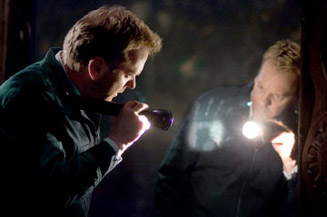Movie Review: Mirrors
By Matthew Huntley
August 25, 2008
BoxOfficeProphets.com

If the makers behind Mirrors knew this, the movie might have amounted to something scary and effective. But director Alexandre Aja takes a more sensational and stylistic (and unfortunately conventional) approach, which presents the plot in an all too goofy a manner. As a result, we don't respond to the movie as much as we'd like to; not that we don't enjoy some of the ride.
Once again using Asian cinema as inspiration, Aja's movie is a remake of the South Korean film, Into the Mirror, unseen by me, but I'm willing to bet it's not as noisy or laughable as the American version. Kiefer Sutherland stars as Ben Carson, a depressed, alcohol-prone NYPD detective who's been suspended from duty after accidentally killing a fellow officer. It's a good thing Ben keeps a newspaper headline of this information in plain sight so we know what's going on (it also helps that he states it in a later scene just in case we didn't pick up on it).
Ben is currently estranged from his wife Amy (Paula Patton) and their two kids. He crashes on his little sister's (Amy Smart) couch and takes a job as a security guard at a burned-down department store, which, before that, was a psychiatric hospital for the schizophrenic. One of the striking things about the movie is the set of the old store. Production designer Joseph C. Nemec III does a terrific job of creating a dilapidated, murky and overall unwholesome environment with which to center the action and tension.
What's peculiar about the run-down building are its pristine mirrors, clean, shiny and unscathed. During his nightly round, Ben starts to notice strange things happening in and around the mirrors, like screams from a far off distance even though no one is there; or burn victims being tortured in the reflections; and the glass being impervious to shatter. After Ben shoots it, it reforms like new. Eventually, Ben sees horrifying images in the mirrors and starts to feel like he's being burned and deformed. Are the mirrors trying to tell him something? They finally spell out the name "Esseker" and Ben makes it his mission to get to the bottom of it before he or his family become victims (he learns other security guards and their families died because they couldn't find out what "Esseker" meant).
What "Esseker" means, I will not say, because despite its goofiness, the plot of Mirrors does hold our interest. It doesn't merely throw away all its mystery and detective work for bombastic storytelling. Kiefer Sutherland does a good job of convincing us he's an obsessed man with deep emotional problems and we do care about him. I also liked Paula Patton, who may have a lot to learn about acting but has the kind of nature to invoke sympathy.
But the movie is over-told and lacks a faith in the audience to follow the story using visuals and intelligence. It spells everything out and rushes from one scene to the next out of fear the audience might become impatient with pure mood and tone. Every plot development is reiterated with dialogue and the characters speak everything they think and read. For instance, when he's digging for answers in old newspaper clippings, Ben reads all the headlines out loud. Do the filmmakers really think people do this? Along with the obstreperous soundtrack (loud shrieks, pigeon flapping its wings, thunderous musical score), the movie feels bloated with more noise than it needs.
Compared to other recent American horror fare (The Grudge 2, Prom Night), Mirrors is well made but not exactly well told. It's tolerable and moderately intriguing, thanks to its manipulative plot and exceptional production design. I admit I was always curious where it was taking me and it was fun to look at. I also loved the ambiguous twist at the end, which is handled magnificently because the filmmakers finally trust us to get it on our own. It's at this point you realize if the movie had only done more showing and less telling (and eased up on the noise), it would have been a keeper.